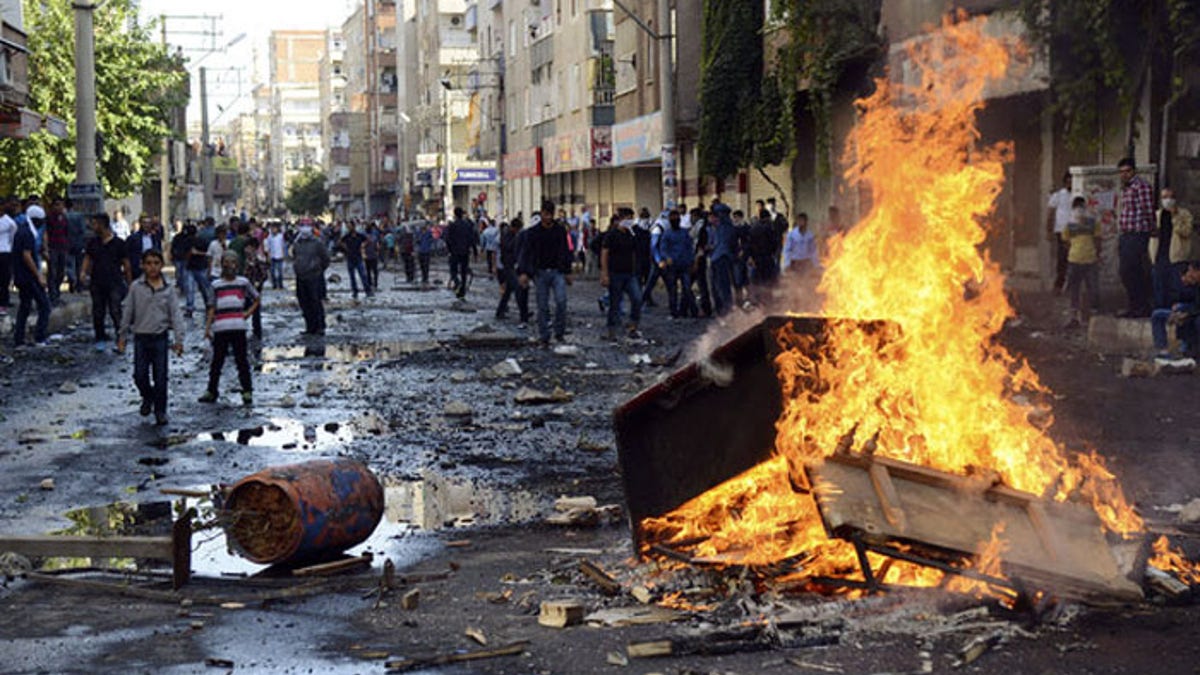
Kurdish protesters set fire to a barricade set up to block the street as they clash with riot police in Diyarbakir, Turkey. (Reuters)
Kurdish protesters in Turkey demanding a show of force against Islamic State instead felt their government’s heavy boot Tuesday, as rubber bullets and tear gas rained down and heavy trucks rolled in to major cities where people took to the streets to decry the fall of the Syrian border city of Kobani.
As many as 19 people were killed around the nation in clashes with police over the government’s unwillingness to aid Kurds trapped in Kobani, a Syrian city a stone’s throw from the border and under siege by Islamic State. The unrest, which continued on Wednesday, came as Turks marked a religious holiday normally reserved for family time and feasting.
Protesters outraged that Turkey was “letting Kobani fall” burned Turkish flags and statues of Kemal Ataturk, the founder of the modern Turkish republic, gestures that are likely to infuriate nationalist Turks and the government.
Solidarity protests began last week when images of Kurds fleeing Kobani and pouring into Turkey sparked a global call for action against Islamic State. But while U.S.-led fighter planes have led a Western coalition in bombing runs in an effort to halt Islamic State’s advance, Turkish troops have remained massed on the border.
Before the civil war in Syria started three years ago, approximately 400,000 people lived in the town of Kobani, with hundreds of thousands more in surrounding villages. But as Islamic State fighters have routed village after village in the largely Kurdish area, refugees have flocked first to Kobani, then, in large numbers, into Turkey.
Until now the area has been protected by Kurdish fighters, known as the People’s Protection Units (YPG), but the besieged forces in Kobani now say they are running out of ammunition and could not prevail without infusions of troops and arms from Turkey. Independent analysts and some influential members of Congress concurred, deriding the airstrikes in Kobani as too little, too late.
With the U.S.-led airstrikes proving largely ineffective against the terrorist organization, the protesters were angry that Turkey was refusing to send in ground forces. Many Kurds want Turkey to ease the passage of weapons to the Kurdish YPG, a move that Ankara is reluctant to sanction.
As protests mushroomed Tuesday, demonstrators accused President Racip Tayyip Erdogan's government of supporting Islamic State. On Tuesday night, police intervened using tear gas and rubber bullets, with reports of live ammunition in some cases. Eight people died in the southeastern province of Diyarbakır, close to the Syrian border. Thirty people, including eight policemen, were injured in Istanbul, while 98 protesters were detained, according to the Istanbul officials. A group of masked protesters barricaded a road in the capital city of Ankara before being dispersed by the police and the city of İzmir saw 26 arrests.
Kurdish leaders condemned the violence and accused some of the provocateurs of undermining their cause.
"I condemn those who burn flags and Ataturk sculptures. These are provocations carried out to prevent help coming to the East (toward Kobani) from the West," Selahattin Demirtaş, co-chair of the HDP, Turkey's leading Kurdish party.
The fighting is driving a wedge in a delicate domestic process to forge peace with Kurdish separatists in Turkey, who are now helping their brethren in Syria fight Islamic State. The fate of a small, once-forgotten town near the Turkish border is stirring up the decades of tensions between Turkey’s nationalists and Kurdish population.
Abdullah Öcalan, the jailed leader of PKK, last week warned that a massacre of Kurds in Kobani would doom a fragile peace process with the Turkish authorities aimed at ending the group's 30-year violent campaign, which has left an estimated 40,000 people dead.







































